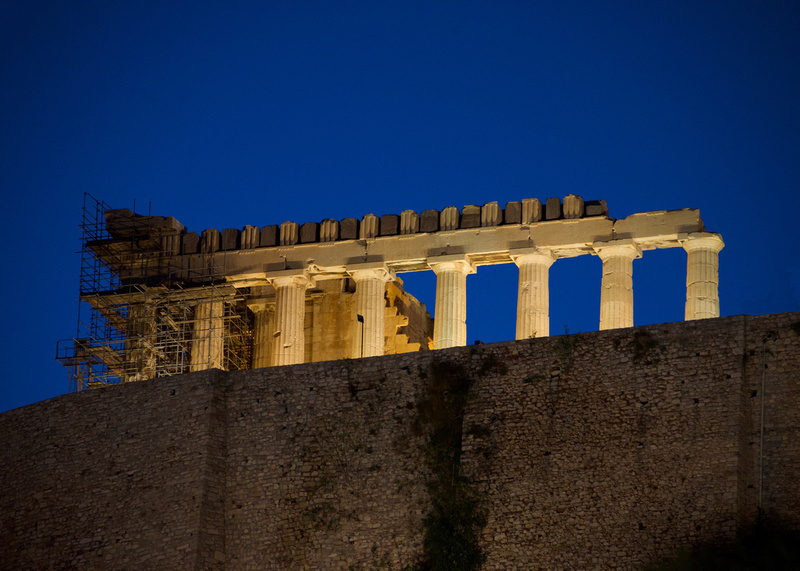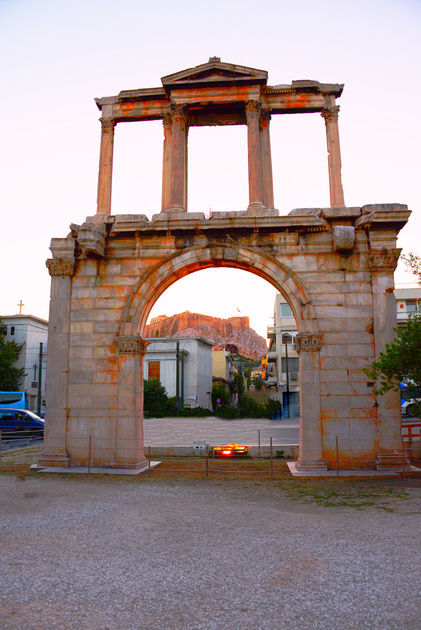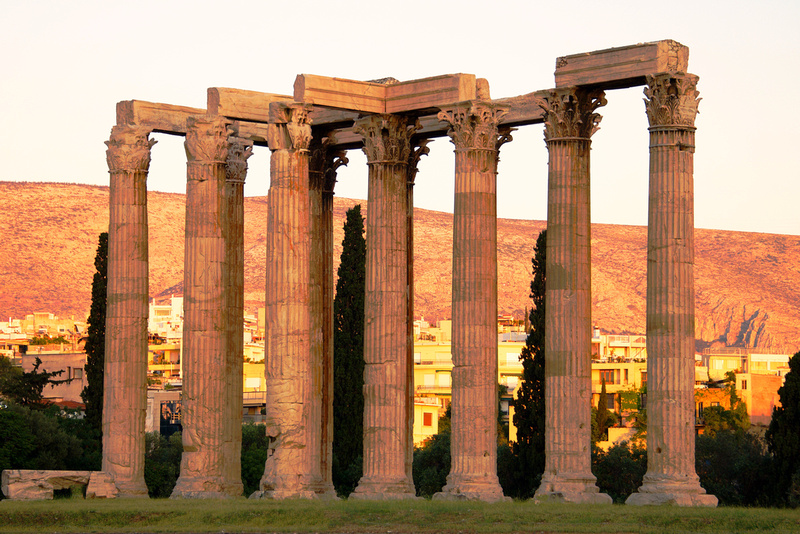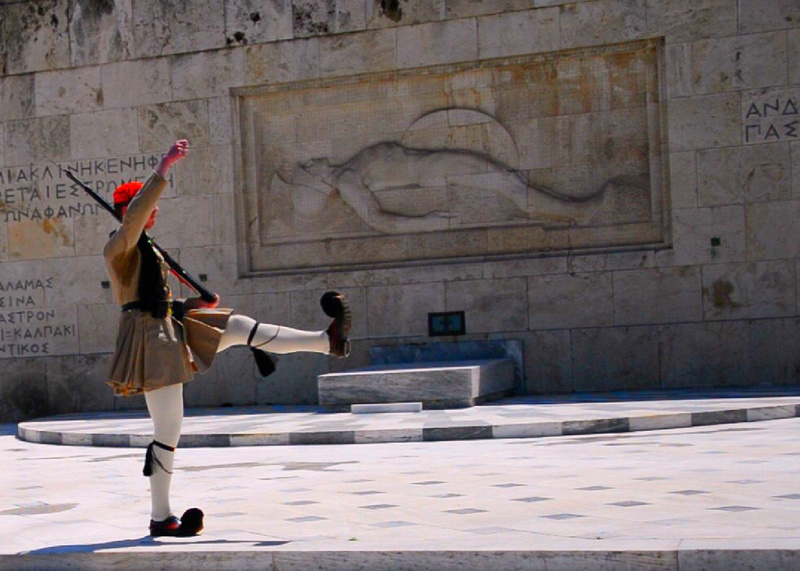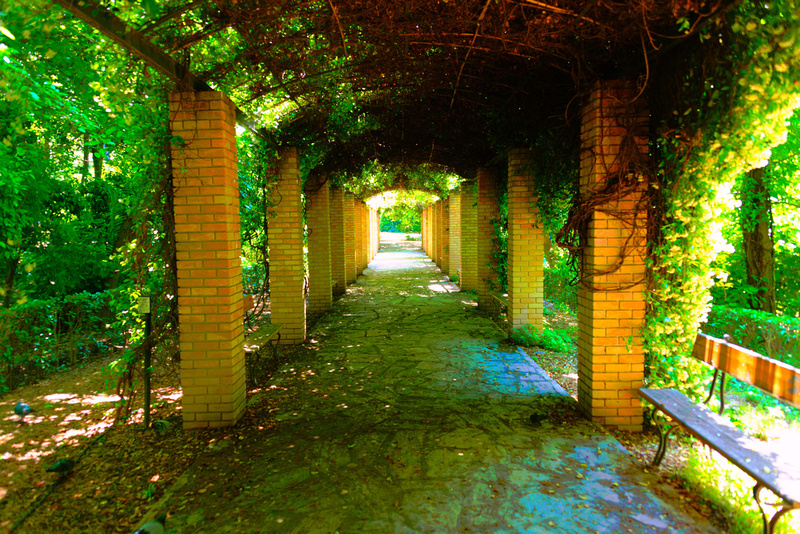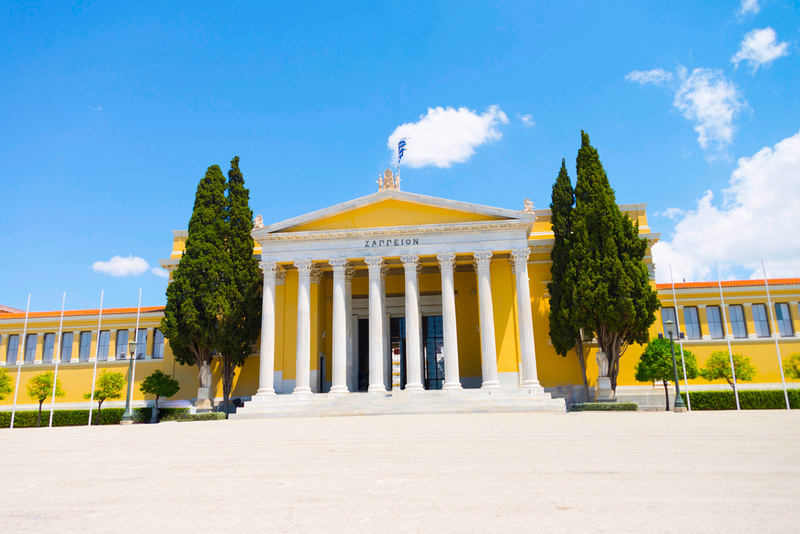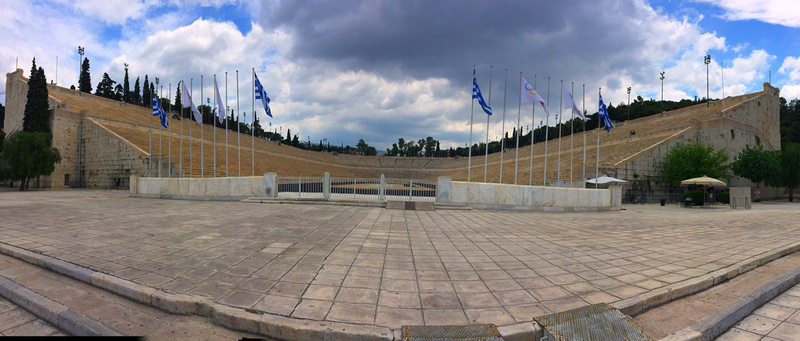Our Athenian Walking Tour: Stop 3 and 4
Welcome to "Our Athenian Walking Tour: Stop 3 and 4"
~ Memor Spiritus ~
THE PARTHENON AT NIGHT
The Arch of Hadrian, most commonly known in Greek as Hadrian's Gate
is a monumental gateway resembling - in some respects - a Roman
triumphal arch. It spanned an ancient road from the center of Athens, Greece,
to the complex of structures on the eastern side of the city that included the
Temple of Olympian Zeus. It has been proposed that the arch was built to
celebrate the arrival of the Roman Emperor Hadrian and to honor him for his
many benefactions to the city, on the occasion of the dedication of the nearby temple
complex in 131 or 132 AD. There were two inscriptions on the arch, facing in
opposite directions, naming both Theseus (the mythical king and founder-hero of Athens)
and Hadrian. It is said that the arch separates the Old and the "New" Athens.
Hadrian's Gate
The Temple of Olympian Zeus, also known as the Olympieion, is a monument and
former colossal temple at the centre of the Greek capital Athens. It was dedicated to
Olympian Zeus, the sky, thunder and lightning god in ancient Greek religion, who
ruled as king of the gods of Mount Olympus.
Construction began in the 6th century BC during the rule of the Athenian tyrants
(in Ancient Greek = authoritarian sovereigns), who envisaged building the greatest
temple in the ancient world, but it was not completed until the reign of the Roman
Emperor Hadrian in the 2nd century AD, some 638 years after the project had
begun. During the Roman period the temple - that included 104 colossal columns -
was renowned as the largest temple in Greece and housed one of the largest
cult statues in the ancient world.
Temple of the Olympian Zeus
~ Stop 4 - Syntagma Square ~
You will find the Monument of the Unknown Soldier in Syntagma (Constitution) Square.
Its central part, created by the sculptor Fokion Rok, depicts a naked dead soldier only
carrying his armor. This image was inspired by a sculpture on the pediment of the
ancient Temple of Aphaia on Aegina Island. Writings from Pericles' funeral oration,
as it was passed on by Thucydides, are engraved on the wall around the soldier.
On the two sides of the monument there are copper plates listing all the military events
in which Greece has taken part from the Greek War of Independence (1821) until today.
The monument is guarded 24 hours a day by the Presidential Guard, also known as Evzones
(Evzoni), who are wearing the traditional 19th century costume from southern Greece. The most
characteristic parts of this uniform are the skirt called foustanela and a pair of tsarouhia - red
leather clogs with black pompoms. But there is more to these men than their unique uniforms.
The Evzones, colloquially called tsoliades, are usually selected from the Greek special army forces.
To be part of this elite unit, a junior Evzone has to undergo intense training; he needs to learn how
to stand for several hours in a row, avoid eye contact, stare at an imaginary point without flinching
or blinking his eyes and lift his leg up to shoulder height. He must also meet the height requirement
set at 1.87 metres (6.1 feet). The Evzones' duties include standing guard in front of the Tomb of
the Unknown Soldier on Syntagma Square every day in all conditions.
Evzone at Monument of the Unknown Soldier
Adjoining the monument is the National Garden (formerly the King's Garden) which
is like a tropical paradise right in the middle of Athens.
National Garden
If you walk downhill on Irodou Attikou you will pass Zappion on the right, where in
the summer you can see puppet theater (Karagiosis) and other forms of entertainment
at the large outdoor cafe. Some summers they have outdoor movies here. This area
is a popular place for Athenians to stroll and sit when the weather is nice. The Zappion
is used as an exhibition hall and for official events so take a look inside and see if there is
anything going on. There are park benches and a couple cafes in the area between Irodou
Attikou and Amalias street. The Zappion was built in 1878 and donated to the nation by the
Zappas brothers from Ipirus. This building was the first to hold an indoor
Olympic event, in the 1896 Olympics.
The Zappion
Across the street from the Zappion is the Panathinaiko Olympic Stadium. The stadium was
rebuilt entirely of marble in 1896 for the first modern Olympics by Evangelis Zappas and
George Averoff, though it was previously rescued from antiquity and restored in 1870, also
by the Zappas. The stadium was originally built in 330 BC for the Panathenaic Games.
These games were held every four years in Ancient Greece from 566 BC to the 3rd century AD
and incorporated religious festivals, ceremonies (including prize-giving),
athletic competitions, and cultural events.
Panathinaiko Olympic Stadium
Be sure to read more blogs about "The Story Behind the Pictures"
from these great Memor Spiritus Artists.
PLEASE check out all of the wonderful photographs on this unique site:
Simply "click" on any pic in this blog to go straight to Checkout!
ALL ORIGINAL ARTWORK IS AVAILABLE ON OUR WEBSITE

